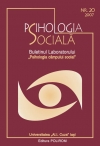Relaţiile dintre pãrinţi şi copii: o strategie în sprijinul rolului pãrinţilor
Relations between parents and children: a strategy to support parents' role
Author(s): Debora SommellaSubject(s): Psychology
Published by: EDITURA POLIROM S.A.
Summary/Abstract: This article proposes a critical analysis of the potentialities of an intervention strategy, parental education (PE), inspired by the humanistic theories of Maslow (1962), Rogers (1969) and Gordon (1976), designed to develop a certain feeling of competence and trust for parents, which is called - empowerment - by Rappaport (1981) and it is based on the conviction that each individual is capable of defining and understanding its own needs and finding the best strategies for satisfying them (Dunst, Trivette, 1988). PE represents a specific socioeducational strategy that promotes taking responsibility in a conscious way of the parenting role, an irreplaceable function impossible to delegate. The PE interventions are divided on three distinctive levels which assume different states of involvement: from the informative ones and the self-teaching ones, to the hetero-teaching interventions. The efficacy of this educational strategy is due to the competence of the operators which, by valuing the capacity of the participants, are favoring a process which leads to the independent management of the parenting role.
Journal: Psihologia socială
- Issue Year: 2007
- Issue No: 20
- Page Range: 80-91
- Page Count: 12
- Language: Romanian

